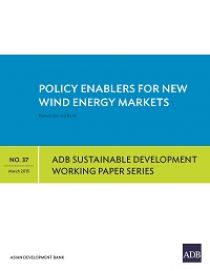ADB has published "Policy Enablers for Wind Energy Markets" by Bo An and Pramod Jain, as part of Sustainable Development Working Papers series. Paper is available at: http://www.adb.org/publications/policy-enablers-new-wind-energy-markets.
The focus of this publication is on wind energy policies that can support sustained development of wind power in emerging wind energy markets. The policies are based on the work done by the Quantum Leap in Wind Power Development for Asia and the Pacific (QLW). The focus of QLW is on three countries—Mongolia, Philippines and Sri Lanka. The success and failures of wind energy policies in the three countries are analyzed in this report and form the basis for the recommendations. A wind energy policy framework is proposed for the emerging wind energy markets. The components of the policy are:
- Incentives, which play a central role in policy. An effective policy should balance supply-side and demand-side incentives. Often the focus is on supply-side incentives like feed-in tariff (FiT) with standardized power purchase agreement (SPPA). In most cases, policies contain weak demand-side incentives and often their implementation is ignored.
- Grid integration policy. SPPA is accompanied with “guaranteed interconnection” and “priority dispatch” for wind power plants. This is insufficient. Experience has shown that grid can be one of the primary bottlenecks to wind power development. Therefore, grid integration is a vital component of policy and it must be based on an integrated power systems study of the network with various wind penetration scenarios. Such a study would assesses the current capabilities of the grid and the upgrades required to transmission, substations, ancillary services, existing generators and dispatching process.
- Wind exploitation policy. Identification of wind corridors or preferred wind project zones, creation of long-term wind measurement campaigns and regular update of wind resource maps are policies that support reduction of lead time and cost of wind power installations in emerging wind markets.
- Licensing guidelines. One-stop shop that coordinates all the licensing, approvals and permits is a policy that can attract investors to the wind industry.
- Public awareness and human resource development. Proactive public awareness policies can significantly reduce opposition of wind farms while proactive human resource development policies can increase the amount of work done by in-country personnel thereby increasing the benefits realized by country’s investment in wind energy.
